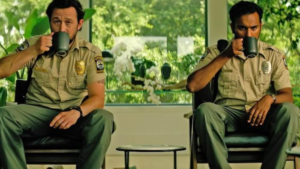Now in its 27th year, the Melbourne Queer Film Festival has presented the best of queer cinema from Australia and around the world. The festival has continued to evolve, and this year the organisers present their largest and most diverse program yet, offering a mix of genres, documentaries and short film packages. The opening night film is I Am Michael, starring James Franco, and is based on the controversial life story of celebrated gay activist Michael Glatze. It also stars Zachary Quinto, from the rebooted Star Trek series. The closing night film is the comedy Women Who Kill.
The festival screens at ACMI cinemas from March 16-March 27.
ALL REVIEWS BY GREG KING
LAST UPDATED MARCH 7 2017
PARIS 05:59

Bold and confronting, Paris 05:59 is not a film for everyone’s tastes. Theo and Hugo meet at the red-lit basement of a Paris gay club and have sex. A connection has developed between the pair, and they leave and wander the streets of Paris in the early hours of the morning. Hugo (played by Francois Nambat, from The Missionaries, etc) is HIV positive, and Theo (Geoffrey Couet, in his feature film debut) admits that his condom broke. There is some frank discussion of the likely consequences and a quick visit to the emergency room of the nearby hospital for some medical advice before they continue their nocturnal journey through the streets of Paris. They talk about their lives, their fears, living with HIV, and about the prospect of a relationship.
Take out the graphic, explicit twenty-minute orgy/sex scene (with apparently genuine on-screen sex) that opens the dialogue-driven film and this could well be a Gallic gay variation of Richard Linklater’s Before trilogy. It also has thematic comparisons with Andrew Haigh’s Weekend. The film unfolds almost in real time, and there is a digital clock overlaid on some scenes as a reminder of the time passing. Paris 05:59 (aka Theo And Hugo) is essentially a two-hander as we follow Theo and Hugo, although there are a few other peripheral characters they interact with during their meandering journey. Couet and Nambat make for a charismatic and handsome couple, and the time spent in their company is pleasant enough. The dialogue is casual and natural, and often banal, giving it a sense of veracity. Directors and regular collaborators Olivier Du Castel (a former sound editor) Jacques Martineau (the gay themed romance The Adventures Of Felix, etc) and cinematographer Manuel Marmier make good use of the Paris streetscapes.
★★★★
BEING 17.

The latest queer themed coming of age film from director Andre Techine (Wild Reeds, etc) is a strong and powerful portrait of class and race, the difficulties of being a gay teenager, ideas of masculinity and sexual identity, the thrill of first love, as it explores the burgeoning romance between two boys from different backgrounds.
Damien (Kacey Mottet Klein, from Sister, etc) is a gangly teen and something of an outcast who is often bullied at school. His tormentor is Thomas (newcomer Corentin Fila, in his film debut), a mixed -heritage farm boy who has to travel several miles every day to reach school. Both boys are loners. After the two boys have a fight at school, Damien’s mother Marianne (veteran French actress Sandrine Kiberlain), the local doctor, visits Tom’s farm to try and negotiate a solution to the bullying. She is shocked to discover the harsh conditions he and his family have to endure at their farm. Tom has to work hard on the farm before spending two hours travelling through snow and harsh mountainous terrain to reach school every day. Tom’s mother is pregnant and sick. Marianne invites Tom to stay with her family until the end of the school year. Given the close proximity they share, Damien’s desire for Tom intensifies. The tension that develops between the two boys soon turns to something more as they confront their own feelings for each other. The tension between the two boys is palpable.
Techine deftly taps into a very real emotional connection with his two adolescent protagonists. The two young leads deliver superb and confident performances, especially Klein who has to convey the complex emotional turmoil his character experiences. Kiberlain also delivers a wonderful performance as Marianne, Damien’s well-meaning mother who seems to understand the nature of the relationship between the two boys.
The 73-year-old director seems to have a great understanding of adolescent angst and the difficulties facing young gay teens and his direction is a welcome return to form for the filmmaker. He has co-written the film with Celine Sciamma (Girlhood, etc) and Being 17 is a wonderfully observed drama. Sciamma is an exciting new voice in the subgenre of coming of age and exploration of adolescent sexual awakening with films like Tomboy, Girlhood to her credit, and she brings a strong sense of humanity and compassion to the material. For his part Techine seems invigorated by the collaboration and he directs with great sensitivity and he brings a subtle eroticism to the material. The film has been superbly shot by cinematographer Julien Hirsch, whose widescreen lensing of the snow-covered Pyrenees is a highlight.



